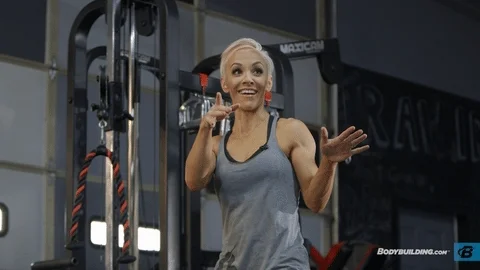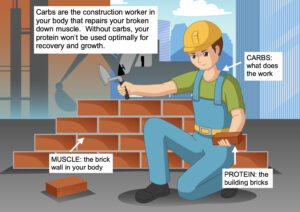January 17, 2025
Oh, the age-old debate: to carb or not to carb?
Well, if you’re dreaming of building mountains of muscles and staying lean in the process, you might want to buddy up with carbs. Here’s the scoop on why carbohydrates are a must-have in your muscle-building and fat-burning arsenal. Let’s get into the good stuff that’ll make your gym sessions count!

Why You Need Carbs to Build Muscle & Burn Fat
First things first, let’s debunk a big ol’ myth: carbs are not your fitness foes!
While protein often steals the spotlight when talking about building muscle, carbs are actually the behind-the-scenes heroes. Think of carbs as the fuel that keeps the muscle-building factory powered up. Without enough carbs, your workouts might not be producing the muscle growth you might think from those workouts, and that could be directly impacting your ability to get or stay lean.
Carbs: The Work Horse
Science has undisputedly shown that carbohydrates are the preferred source of energy in the human body. What exactly does this mean?
It means that the human body is biologically able to break down this fuel source and convert it into usable energy for us faster and more effectively than any other macronutrient (fats or protein).
In fact, contrary to what you might think, fat (either dietary or stored fat on the body) is broken down and converted into usable energy at a very slow rate – not fast enough to provide the energy required in the body during a weight lifting session.
Guess what happens if your body doesn’t have enough of that carb energy to fuel your lifting session?
Think it then starts to burn your fat? Nope.
Fats are converted into usable energy very sloooooowly in the body. They’ll help provide the energy needed throughout your normal daily movement and/or for a long, lower intensity endurance type of activity – but not for lifting (which are short intense bursts). Carbs are needed for that. Not enough of them? The next thing the body will break down to attempt to get the energy it needs – muscle 😳
But Yvette, why would the body break down your muscle to try to get the energy it needs for lifting?
Because your muscle is basically a big pile of stored proteins and carbohydrates. You probably knew those muscles were made of protein, but maybe didn’t realize that carbs are stored within your muscle cells as well – as glycogen. So when you start training and your body needs energy, it grabs those stored carbs first – exactly what we want it to do.
But when those stored carbs in the muscles and those stored in your liver (from the carbs you’ve eaten) are all used up – maybe because there wasn’t many to begin with because you’ve been fooled by the internet and haven’t been eating enough carbs – well, then your body will resort to breaking down the proteins in your muscles to try to convert them into usable energy.
When you’re carb-depleted and are engaging in high-intensity training like weight lifting, your body may indeed turn to muscle protein for energy through a process called gluconeogenesis that turns the proteins into carbs (or glucose) in your body.
Obviously this is not ideal for muscle building, but it also impacts recovery. Remember that carbs are stored in your muscles too? Those carbs being there, especially post-workout, help provide the energy needed to help the muscles repair.
When I teach sports nutrition, I like to use this analogy.
- You’ve had a great workout, aka broken down some muscle fibers (that’s how we build muscle: we create teeny tiny damage in the muscle cells, then our bodies repair that damage, thereby making the muscle bigger and stronger).
- The brick wall is your bicep that you just worked. The fallen brick (aka your muscle fibres) need to be replaced and repaired – the brick needs to be put back onto the wall. Protein is literally the building bricks of your muscle.
- The brick (protein) is not just gonna magically get back onto the wall itself (muscle). In the case of the brick wall, it’s the brick layer or construction worker that’s gonna do the work of putting the brick back onto the wall and reinforcing it to make it stronger. In your body, carbs are the workers! They do the work on placing your proteins in your muscle.
- So all the protein in the world will only go so far! You need the carbs to supply the energy to do the work in repairing and building that muscle.
Muscle Up to Be a Fat-Burning Machine
Other than looking great, improved cardiovascular and bone health, better sleep quality, and more… another fantastic benefit of building muscle is that you turn your body into a fat-burning machine.
Muscles are pretty high maintenance – they need a lot of energy (aka calories) to maintain themselves. So, the more muscle mass you have, the more calories you burn all day, every day—even during your Netflix marathons!
When to Embrace the Carbs
Timing is everything with carbs. Munch on complex carbs (think whole grains and veggies) a few hours before you hit the weights to fill up those glycogen stores. Post-workout, it’s time to bring in some more carbs to speed up recovery and prep you for the next session.
What Carbs are Best
WHOLE GRAINS
Foods like oats and whole-wheat bread are a great option when you’re looking to build muscle and lose fat. Not only are whole grains full of fiber, which will help keep your blood sugar steady, but they also help keep your belly full until your next meal or snack.
FRUITS & VEGGIES
Fruits and veggies contain vital nutrients your body needs during the muscle-building process. Vitamin C — found in bell peppers, broccoli, strawberries and citrus fruits — is HUGE for the growth and repair of body tissues.
Plus, eating more plants has been linked to lower rates of developing many diseases, including heart disease, type 2 diabetes, obesity and some cancers.
BEANS & LEGUMES
Beans and other legumes provide a powerful punch of muscle-building plant protein.
QUINOA
Like whole grains, this super seed is a complex carb. But it’s also one of the few plant-based foods that’s considered a complete protein, meaning it contains all the nine essential amino acids our muscles need to grow.
Interested in figuring out just how many carbs you need for your body, workouts, and goals? We can help!
Why You Need Carbs to Build Muscle & Burn Fat
The entire contents of this website are based upon the opinions of Build Holistic Nutrition. Please note that Build Nutrition is not a dietitian, physician, pharmacist or other licensed healthcare professional. The information on this website is NOT intended as medical advice, nor is it intended to replace the care of a qualified health care professional. This content is not intended to diagnose or treat any diseases. Always consult with your primary care physician or licensed healthcare provider for all diagnosis and treatment of any diseases or conditions, for medications or medical advice, as well as before changing your health care regimen.
© BUILD NUTRITION 2026. ALL RIGHTS RESERVED. PRIVACY POLICY
Go ahead, creep us on social. You know you want to!


